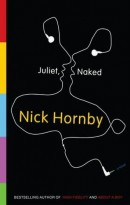 Hornby’s latest obsessive, boyish protagonist is Duncan, 40-something going on fetal. He reveres the music of Tucker Crowe, an American singer-songwriter who suddenly and mysteriously retired and disappeared in 1986. Duncan listens to Crowe’s most famous record, Juliet (a break-up chronicle compared to Dylan’s Blood on the Tracks, Springsteen’s Tunnel of Love, and an unlikely melange of other influences), in two ways: the album as it was officially released and “with the songs placed in the order that Tucker Crowe originally wanted them, according to the sound engineer in charge of the sessions.” The discovery of an acoustic demo version of the album sends a ripple through the Crowe-adoring community and through Duncan’s relationship with Annie, his longtime girlfriend. Annie doesn’t like the demo version — and she learns that Crowe agrees when he gets in touch by e-mail. The well-drawn portrait of a female costar distinguishes Juliet from Hornby’s previous fiction, but the novel also covers familiar territory.
Hornby’s latest obsessive, boyish protagonist is Duncan, 40-something going on fetal. He reveres the music of Tucker Crowe, an American singer-songwriter who suddenly and mysteriously retired and disappeared in 1986. Duncan listens to Crowe’s most famous record, Juliet (a break-up chronicle compared to Dylan’s Blood on the Tracks, Springsteen’s Tunnel of Love, and an unlikely melange of other influences), in two ways: the album as it was officially released and “with the songs placed in the order that Tucker Crowe originally wanted them, according to the sound engineer in charge of the sessions.” The discovery of an acoustic demo version of the album sends a ripple through the Crowe-adoring community and through Duncan’s relationship with Annie, his longtime girlfriend. Annie doesn’t like the demo version — and she learns that Crowe agrees when he gets in touch by e-mail. The well-drawn portrait of a female costar distinguishes Juliet from Hornby’s previous fiction, but the novel also covers familiar territory.
The Wall Street Journal says the novel “will neither win over [Hornby’s] detractors nor disappoint his admirers.” The Independent says, “It is a largely interior novel, of which it might be said that not a lot happens.” The lively interior material is more than enough to propel a reader through the novel, but what happens is disappointing: an early scene where Duncan runs into another loyal, much younger fan outside of Juliet’s house is ridiculous; an ongoing confusion in which Crowe fans believe a photograph of a raging hermit is in fact their hero is unbelievable; and the eventual meeting between Tucker and Duncan leads to some seriously strained dialogue. (I found myself, like Julie Myerson, hoping “that the whole point of Hornby’s novel would be that Tucker Crowe would never actually appear.”)
If Juliet, Naked (or any of Hornby’s novels) was more purely ruminative and less plot-driven — something more like Alain de Botton’s On Love — it would have been improved. Hornby’s personally flavored cultural criticism gets him grief from hipper crowds, but his nonfiction writings about music (Songbook
), books (his series of columns
for The Believer), and soccer (Fever Pitch
) are a purer distillation of his voice and strengths than can be found in his novels. That said, Juliet, Naked is studded with insight about subjects that seem insight-proof at this late date: cohabitation, technology’s effect on music-listening habits, and prolonged adolescence, among others. (The oddest thing about Hornby is that he’s 52 but more convincingly captures the inner life and concerns of the previous generation than, say, 37-year-old Chuck Klosterman.) As the Independent review puts it, “If [Hornby’s] prose wasn’t so refreshingly transparent and conversational, and his subject matter so seemingly prosaic, the sophistication of his enquiries into human nature would be recognised more often.”
Juliet, Naked by Nick Hornby
Riverhead, 416 pp., $25.95

